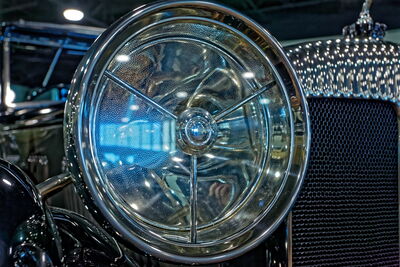In Defense of Post Processing
Dec 21, 2018 11:04:31 #
bsprague wrote:
Adusting, aiming and recording is "shooting". Creating a view that communicates a feeling, an emotion or idea is "photography".
As a Lightroom photographer, do you miss your old darkroom? Mine was a dream come true but had to abandon it due to a job move.
As a Lightroom photographer, do you miss your old darkroom? Mine was a dream come true but had to abandon it due to a job move.
Actually, I miss it only a little. I would not have been able to afford shooting enough to reach the level I am at today.
I have gained so much skill over the last 17 years shooting digitally because I can afford to take so many more photos. I have learned more about photography in that time than I did in the previous 23 years!
The cost of an Adobe subscription compared to the money for equipment, chemicals, paper, film, time involved, etc. is not even worth thinking about!
Dec 21, 2018 11:06:00 #
I agree 100%. I have seen what has been done to manipulate most photographs and am amazed. When I first started my photography journey, I was one of those that touted “natural light photography” and no post processing (eye roll...lol). I use Lightroom mostly and at first I only cropped and slightly adjusted exposure when needed. Then I learned what an amazing tool it is. I focus on wildlife and it definitely comes in handy when a bird that you’ve never seen before lands on a branch for exactly 2 seconds and you get the shot and go to look at it and it’s too dark to even identify the bird! I have accepted that it is part of the photography process now and my images show the difference. Thanks for your post.
Dec 21, 2018 11:13:12 #
I agree but with the caveat that if it for actual photojournalism nothing should be added, subtracted or manipulated. If I'm not mistaken there have been prominent photojournalists fired for even minor alterations.
Dec 21, 2018 11:17:42 #
rond-photography wrote:
This is my first "new topic", and it may... (show quote)
Are you trying to convince yourself or others? I ask because most people are closed minded about their opinions with def ears.
I see and appreciate many pictures run through picture makers. Personally I prefer to spend as little time as possible on computers (I spent 20 years as a programmer and system admin so yeah, I know computers). That includes cell phones. I play with my camera as a hobbyist and I'm not interested in post processing. I do crop some but even that's done reluctantly. Generally if it didn't turn out right straight from the camera I try figure out how I could of done it better then it's gone. It helps that I'm not interested in producing that major world acclaimed picture.
Yes, I see picture makers as a good thing for those that are interested and/or for trying to convey a message, especially if you only get one chance to take the shot. I even went through the trouble of learning one and I still wasn't interested, or should I say I lost interest. That's not to say that I won't be interested again some time in the future, but for now, thanks, but no thanks.
It all boils down to what the individual is interested in. One way isn't better than another, they're just different paths to the same place.
Dec 21, 2018 11:57:27 #
mwsilvers wrote:
Honestly, post processing does not need a defense.... (show quote)
My thoughts precisely. Thanks for illucidating so clearly!
Dec 21, 2018 11:58:14 #
Well .., as most of the world has transitioned from film to Digital photography with the initial raised eyebrows in the beginning from the nay sawyers that digital photography was not true photography .. so we have the same people who complain about Post Processing not being true natural photography ..,
If you shoot RAW .., You are automatically intending to Post Process.. , so many don’t know how to Post Edit .., don’t want to take the time to learn or spend the money for the programs .., and that’s ok .., but that’s not to say there is not a place for post processing in today’s digital world .
As mentioned .., Ansel Adams did negative manipulation and negative overlaying , in his defense he did it to mirror what he saw that the camera couldn’t catch .., and convey that to the public .., none the less it was Post Editing after the shot ..
Didital cameras manipulate and post process while they are taking the shot .., that’s what they do .., as mentioned above , there are many digital cameras that you can pre set the WB, contrast , filters etc .., in a sense Post Editing the shot before it is taken .., so we are really left with an argument that has no end .... by the two sides and the in betweens .., who say .., “well.., a little is ok” .., I just up the light a little .. or touch up the clarity a tiny bit ..
I really don’t like the IMHO .., dirty term .., “Photo Shopped” .. For me it it brings up Putting into the shot that which is not there .., vs enhancing and clarifying
That which is ..., it doesn’t really matter .., no one will convince either side of the argument .., so let’s just exist and coincide together in this amazing 21st century of digital photography that is headed down the path of amazing adventures in the process of capturing the eyes mind ..
If you shoot RAW .., You are automatically intending to Post Process.. , so many don’t know how to Post Edit .., don’t want to take the time to learn or spend the money for the programs .., and that’s ok .., but that’s not to say there is not a place for post processing in today’s digital world .
As mentioned .., Ansel Adams did negative manipulation and negative overlaying , in his defense he did it to mirror what he saw that the camera couldn’t catch .., and convey that to the public .., none the less it was Post Editing after the shot ..
Didital cameras manipulate and post process while they are taking the shot .., that’s what they do .., as mentioned above , there are many digital cameras that you can pre set the WB, contrast , filters etc .., in a sense Post Editing the shot before it is taken .., so we are really left with an argument that has no end .... by the two sides and the in betweens .., who say .., “well.., a little is ok” .., I just up the light a little .. or touch up the clarity a tiny bit ..
I really don’t like the IMHO .., dirty term .., “Photo Shopped” .. For me it it brings up Putting into the shot that which is not there .., vs enhancing and clarifying
That which is ..., it doesn’t really matter .., no one will convince either side of the argument .., so let’s just exist and coincide together in this amazing 21st century of digital photography that is headed down the path of amazing adventures in the process of capturing the eyes mind ..
Dec 21, 2018 12:05:26 #
I'm sad to admit this but to remain honest with myself ---
Digital Photography has not made me a better photographer ---
However using a good Camera with above average Lenses then shooting in Raw and then employing a pretty good Post-processing Software on a real nice Computer has allowed me to generate much better looking photographs!
Digital Photography has not made me a better photographer ---
However using a good Camera with above average Lenses then shooting in Raw and then employing a pretty good Post-processing Software on a real nice Computer has allowed me to generate much better looking photographs!
Dec 21, 2018 12:10:21 #
larryepage
Loc: North Texas area
I have changed my opinion around post processing over the last two years. It can be very beneficial at minimum and lead to very beautiful results at best. But I do not think it should be used as an excuse not to exercise care and good technique when capturing an image. At worst the result will be a much better starting place for the editing process, reducing the time and effort required to finish the image. A well-captured image can also provide better clues and reminders around what the subject actually looked like at the time, which can guide better finishing.
Dec 21, 2018 12:12:50 #
I will be the first to admit that Post Processing has not made me a better photographer .., those are learned skills that come with time .., but Post Processing has allowed me to display that which I took .., in a better light .., and I will admit.., I hate flash and seldom ever use it , but post editing has allowed me to use my camera in places where flash would be needed without using it .., IE weddings, funerals etc.
Dec 21, 2018 12:27:21 #
rond-photography wrote:
This is my first "new topic", and it may... (show quote)
Personally speaking, this is the only photo forum I am aware of, where post processing is looked down upon by members from the one I frequent.
However, without exception, those who are against post processing are snapshot shooters. I always make sure to click on their photos (if they even have any posted) and either there are no pictures from them or the ones that do post, well, would be in the recycling bin if I took those snaps. I yet to see anyone from the SOOC crowd post an example that would back their claim.
Dec 21, 2018 12:32:53 #
larryepage wrote:
But I do not think it should be used as an excuse not to exercise care and good technique when capturing an image.
So this mindset, in my opinion comes from a lack of understanding of what post processing is. Can you point me to an example where the photographer didn’t do his or her best at the time of the capture due to having a PP program to fix his or her mistake later on?
Dec 21, 2018 12:50:00 #
larryepage wrote:
...But I do not think it should be used as an excuse not to exercise care and good technique when capturing an image...
tdekany wrote:
I suspect that each time we see a topic that opens, "I was going to throw this away, but..." it reinforces that perception.... Can you point me to an example where the photographer didn’t do his or her best at the time of the capture due to having a PP program to fix his or her mistake later on?
Dec 21, 2018 12:59:05 #
Many people get hung up with 'truth' and 'reality'. They see Post Processing as 'false' or 'artistic license'. As anyone who has taken further education will tell you..Truth and Reality do not exist. Any photographic image is a representation; it is no substitute for being there.
However there is a case for 'misrepresentation' especially where personal gain is a consideration. Winning a prestigious photography award using a 'created image' in breach of the 'aspirations' of a competition is one that has recently been discussed here.
Creating a birth certificate or qualification, producing false insurance documentation etc is a crime. So therefore there has to be a degree of honesty in the 'use' of images.
Many people document their life photographically on Facebook. (which many employer's look at when considering a persons 'suitability' for a job) Trying to show that you are well traveled, or move in a certain aspirational group by using PP could be considered fraud. As would 'proving' you were NOT in a certain place by the use of a doctored image. These capabilities of PP certainly worry people because they appear in the media.
As in most aspects of life, there are extremes 'used by the few' which negate the argument for 'improving' an image. So the question isn't about 'using' PP it is about how honest you are in the use of any and all of your images. What WILL you admit to.
There have been posters here who say 'I do not PP' and then add that they ONLY crop or rotate their images,make subtle adjustment to exposure etc. As if there are 'acceptable limits'. With digital we all have to PP to get the image out of the camera. Once you open that door....The rest is 'always open to doubt and assumptions'.
Isn't life great!
However there is a case for 'misrepresentation' especially where personal gain is a consideration. Winning a prestigious photography award using a 'created image' in breach of the 'aspirations' of a competition is one that has recently been discussed here.
Creating a birth certificate or qualification, producing false insurance documentation etc is a crime. So therefore there has to be a degree of honesty in the 'use' of images.
Many people document their life photographically on Facebook. (which many employer's look at when considering a persons 'suitability' for a job) Trying to show that you are well traveled, or move in a certain aspirational group by using PP could be considered fraud. As would 'proving' you were NOT in a certain place by the use of a doctored image. These capabilities of PP certainly worry people because they appear in the media.
As in most aspects of life, there are extremes 'used by the few' which negate the argument for 'improving' an image. So the question isn't about 'using' PP it is about how honest you are in the use of any and all of your images. What WILL you admit to.
There have been posters here who say 'I do not PP' and then add that they ONLY crop or rotate their images,make subtle adjustment to exposure etc. As if there are 'acceptable limits'. With digital we all have to PP to get the image out of the camera. Once you open that door....The rest is 'always open to doubt and assumptions'.
Isn't life great!
Dec 21, 2018 13:04:35 #
Dec 21, 2018 13:07:13 #
If anyone doubts the OP's level of photographic knowledge, abilities, etc., take a glance at is SmugMug presentation!
https://rond-photography.smugmug.com/Nothing-serious-here/i-H9B6GFd
https://rond-photography.smugmug.com/Nothing-serious-here/i-H9B6GFd
If you want to reply, then register here. Registration is free and your account is created instantly, so you can post right away.










